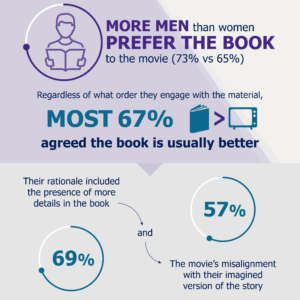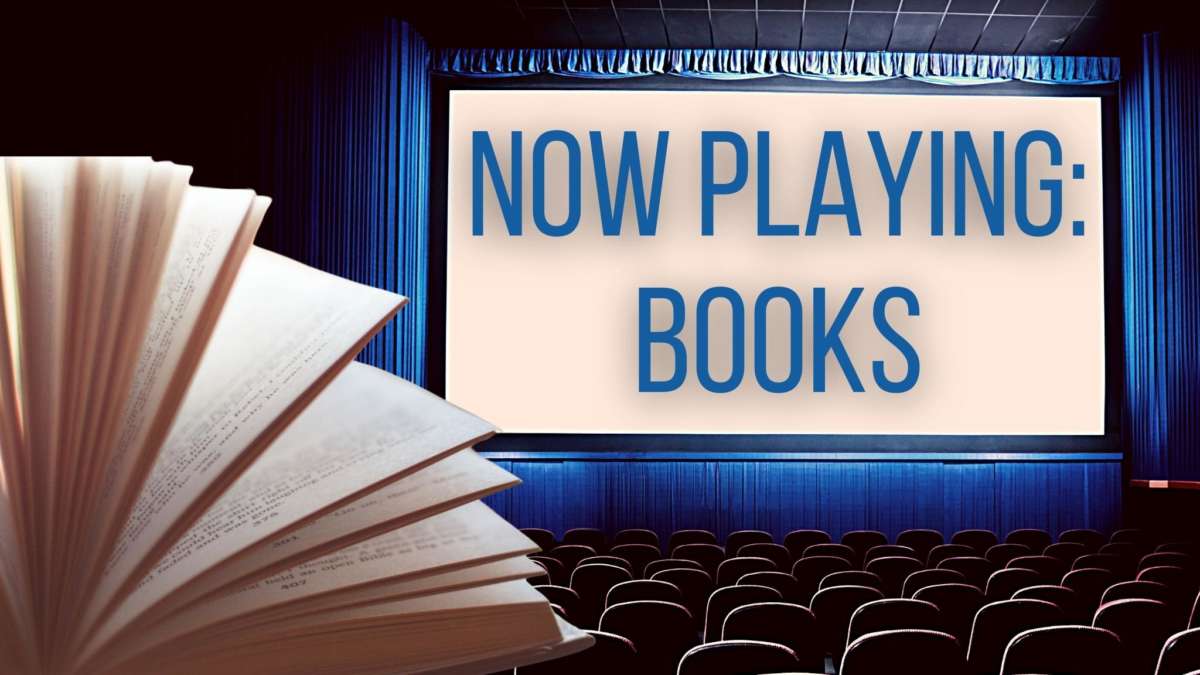Many of us have had this experience: one of our favorite books has been turned into a movie or a TV series and we are so excited to see it come to life on the screen! We might comb entertainment news to find out which actors will play which characters. We might even reread the book so it’s fresh in our minds. What happens next will depend on a combination of things, including your expectations.
What works on the page doesn’t always work on the screen, as we all know. And producers will often tinker with the original story to make it more appealing to a target audience: an otherwise non-romantic character gets a romantic role, a lengthy car chase is inserted, a bunch of events get conflated into one to keep the story arc tight, vital backstories are cut or glossed over for time, and on and on. The question is this: Will these alterations ruin your enjoyment?
A recent survey of 2,000 Americans conducted by OnePoll on behalf of ThriftBooks looked at people’s thoughts on movie adaptations, among other things. It answers some of our most pressing questions on the topic:
 Q: Which should you do first: read the book or watch the screen version?
Q: Which should you do first: read the book or watch the screen version?
A: More than half of those surveyed will usually watch a movie first, then read the book it was based on to compare. This may be surprising to those of us who prefer to read the book so we can better understand what’s going on in the screen version.
Q: Which do most people think is better: books or their screen versions, and why?
A: Most (67%) agreed the book is usually better, with more men than women sharing this sentiment (73% vs. 65%). Respondents’ rationale included the presence of more details in the book (69%) and the movie’s misalignment with their imagined version of the story (57%). Which brings up a good point: it’s not just what’s on the page but what’s in your mind’s eye that can affect your reaction to a screen adaptation of a book you’ve read, and that can be so different from person to person.
Q: How much can a screen version diverge from the book before it starts to bother people, and what are the most annoying divergences?
A: According to the survey, people are okay with a 23% divergence before it becomes a nuisance. The changes that bother people the most are, in order of annoyance:
- Historical inaccuracies (which people tend to notice more so in movies — 59% — than in books — 38%)
- Characters who don’t match physical descriptions from the book (52%)
- Characters who have different personalities from how they are portrayed in the book (51%)
- Screen versions that change the setting or time period of the story (43%)
- Inaccurate or different accents used by characters (28%)
- A different ending from the book (27%)
Yet three-fifths believe these diversions don’t matter if they help to create the best story. “It’s interesting to see that whether or not a story closely corresponds with reality isn’t always the primary factor that makes it enjoyable,” said a ThriftBooks spokesperson.
The same spokesperson added, “People may also be more likely to consider a story worthwhile if it’s been adapted into multiple formats over the years.”
Q: Which begs the question, how often does a bestselling book translate into a blockbuster screen version?
A: Well, the survey didn’t exactly answer that question, but 63% of respondents said they’re more likely to see a movie if they know it’s based on a successful book. No wonder it’s a go-to strategy for film production companies: you’ve got an interested audience before you’ve even bought the rights.
—
So, there you have it. How do your experiences with screen adaptations measure up to the crowd? Which ones have you seen that you feel are the most successful? Which ones were total fails? Let us know in the comments below. And read more about the survey results here.
Related Posts:
More BookTrib coverage of screen adaptations




